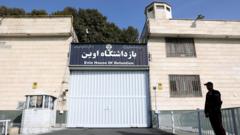Despite claims from President Trump, sources indicate that the strikes had limited impact on Iran's nuclear capabilities.
US Strikes Failed to Disrupt Iran's Nuclear Program, Pentagon Report Reveals

US Strikes Failed to Disrupt Iran's Nuclear Program, Pentagon Report Reveals
A new Pentagon intelligence assessment challenges the effectiveness of US airstrikes on Iran's nuclear facilities.
A recent intelligence assessment from the Pentagon has concluded that the US airstrikes on Iran's nuclear facilities did not significantly hinder the country's nuclear program, contradicting earlier assertions from President Donald Trump. The strikes, which targeted key facilities at Fordo, Natanz, and Isfahan using advanced "bunker buster" bombs designed to breach substantial concrete and earth barriers, reportedly only delayed Iran's progress by a few months.
According to unnamed defense sources who spoke with CBS, the airstrikes failed to destroy Iran's stockpile of enriched uranium, which remains largely intact, as many of its centrifuges survived the attack. Initial damage reports issued by the White House claimed the facilities were "completely and totally obliterated," a narrative now labeled as incorrect by Pentagon assessments.
While some aboveground infrastructure suffered damage and entrances to certain sites were sealed, the fundamental components of Iran's nuclear capabilities remain functional. Moreover, it has been disclosed that a portion of Iran's enriched uranium stockpile was relocated prior to the strikes, further mitigating the impact of the military action.
With repairs expected to take time, the evaluation raises questions about the efficacy of military responses to Iran's nuclear ambitions and underlines ongoing tensions between the US and the Islamic Republic. More developments are anticipated as the situation unfolds.





















